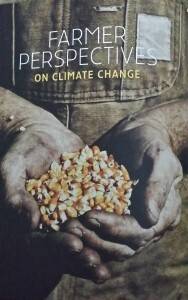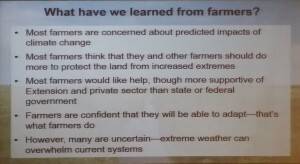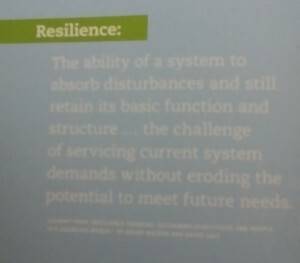 Sustainable and sustainable agriculture can mean different things to different people. So can “climate change.”
Sustainable and sustainable agriculture can mean different things to different people. So can “climate change.”
Last week I was invited to a three-day conference entitled, “Resilient Agriculture: Adapting to a Changing Climate.” Honestly, my shackles went up when I read “changing climate.” I believe the climate is always changing, but unlike the opinion column printed Aug. 9 in The Des Moines Register, I don’t believe agriculture is destroying our environment.
The Register’s opinion page makes it sound like nothing is being done to protect our air and water, as well as prevent our top soil from washing away. Anyone who attended last week’s conference, however, can tell you that’s simply not the case. Massive amounts of research is underway to raise corn more efficiently, which will be a huge benefit as we strive to feed a growing world.
The Sustainable Corn Project is moving new technology forward at an amazing pace. I compared this type of research to the space program. I’m not sure going to the moon helped mankind much, but the technology from the race to the moon certainly did.
 Likewise, researchers are studying ways to apply nitrogen and other fertilizer so nutrients are applied when the plants need it. I learned about an app has been developed to tell me when and how much nitrogen my crop needs. This will result in plants getting more “food” and less fertilizer will up in the Gulf. Win-win.
Likewise, researchers are studying ways to apply nitrogen and other fertilizer so nutrients are applied when the plants need it. I learned about an app has been developed to tell me when and how much nitrogen my crop needs. This will result in plants getting more “food” and less fertilizer will up in the Gulf. Win-win.
New computer apps, as well as new machinery and new plant genetics, will make huge changes in how we farm. Drones and powerful cameras will give farmers tools to see what’s happening in fields, and tell us when and how much water or plant food or treatments the crops will need.
It took three days to present all of the new technology during this conference, so I don’t have the time or space to go into in today’s blog. Fortunately, the conference was recorded and should be accessible online soon at sustainablecorn.org.
 I listened during last week’s conference and came away with some outstanding information. I wasn’t alone. Researchers and scientists from most land grant universities, research companies, conservation groups, and new startup companies also were in attendance. Even companies like Pioneer, Monsanto, John Deere and groups like the United Soybean Board were involved in last week’s conference. It appears this USDA project is meeting its goal of working with farmers, teachers and students to find agricultural practices that:
I listened during last week’s conference and came away with some outstanding information. I wasn’t alone. Researchers and scientists from most land grant universities, research companies, conservation groups, and new startup companies also were in attendance. Even companies like Pioneer, Monsanto, John Deere and groups like the United Soybean Board were involved in last week’s conference. It appears this USDA project is meeting its goal of working with farmers, teachers and students to find agricultural practices that:
- are resilient in times of drought;
- reduce soil and nutrient losses under saturated soil conditions;
- reduce farm field nitrogen losses;
- retain carbon in the soil; and
- ensure crop and soil productivity.
Whether or not I agree with global warming, I can find common ground with these stated objectives. It’s going to take an industry coming together to meet them.
